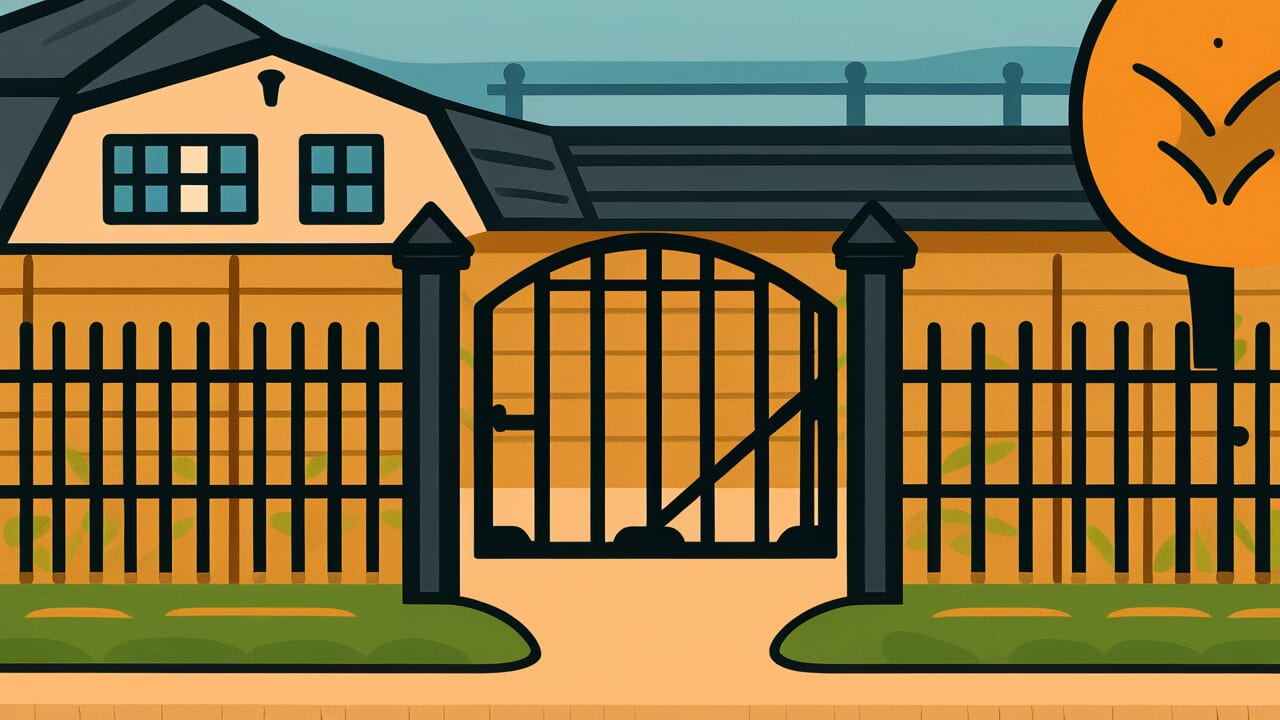How to Read “good fences make good neighbors”
“Good fences make good neighbors”
[good FEN-siz mayk good NAY-bers]
All words use standard pronunciation.
Meaning of “good fences make good neighbors”
Simply put, this proverb means that having clear boundaries between people helps create better relationships.
The saying talks about physical fences between properties. But it really means something deeper about human relationships. When people know exactly where their space ends and someone else’s begins, they get along better. Clear limits prevent many problems before they start.
We use this wisdom in many parts of life today. At work, people need to know their exact responsibilities to avoid stepping on each other’s toes. In friendships, setting boundaries about time and personal space keeps relationships healthy. Even in families, everyone needs some private space and clear rules about what belongs to whom.
What’s interesting about this wisdom is how it challenges our assumptions. Many people think good relationships mean no barriers at all. But this proverb suggests the opposite is true. When boundaries are unclear, people often feel frustrated or taken advantage of. Good fences actually create the safety that lets friendship grow.
Origin and Etymology
The exact origin of this phrase is unknown, though it became widely recognized through poetry in the early 1900s. The concept appears in various forms throughout history. People have always needed to balance community life with personal space.
During agricultural times, property boundaries were extremely important for survival. Farmers needed to protect their crops and livestock from wandering animals. Clear fences prevented disputes about where one person’s land ended and another’s began. These practical needs shaped how people thought about relationships in general.
The saying spread because it captured a universal truth about human nature. As people moved from rural areas to cities, the wisdom adapted to new situations. Physical fences became less important, but the idea of clear boundaries remained valuable. Today we apply this thinking to emotional boundaries, work responsibilities, and personal relationships.
Interesting Facts
The word “fence” comes from the Middle English word “fens,” meaning “defense” or “protection.” This shows how boundaries were originally seen as protective rather than divisive.
The phrase uses parallel structure with “good” appearing twice, making it easier to remember and repeat. This repetition is a common feature in memorable proverbs across many languages.
Usage Examples
- Homeowner to spouse: “I’m installing a privacy fence before talking to our neighbors about their loud parties – good fences make good neighbors.”
- Manager to colleague: “I keep work discussions out of our friendship completely – good fences make good neighbors.”
Universal Wisdom
This proverb reveals a fundamental tension in human nature between our need for connection and our need for autonomy. We are social creatures who depend on others for survival and happiness. Yet we also need personal space and control over our own lives. This creates a delicate balance that every generation must learn to navigate.
The wisdom addresses a common mistake people make about relationships. Many assume that closeness means having no barriers or limits. But human psychology works differently. When boundaries are unclear, people often feel anxious and defensive. They worry about being taken advantage of or losing control. This anxiety actually damages relationships rather than strengthening them. Clear boundaries create a sense of safety that allows genuine intimacy to develop.
The proverb also reflects how cooperation emerges in human societies. Throughout history, successful communities found ways to balance individual rights with collective needs. When everyone knows the rules and respects each other’s space, conflicts decrease dramatically. People can focus on positive interactions instead of constantly defending their territory. This pattern appears everywhere from small families to large nations. The most peaceful relationships often have the clearest agreements about boundaries and expectations.
When AI Hears This
Humans instinctively add small barriers to prevent big disasters. A fence forces neighbors to walk around instead of cutting through. This tiny inconvenience makes people think before acting on impulse. The extra steps filter out casual annoyances and preserve serious interactions. It’s like adding speed bumps to slow down traffic before dangerous intersections.
This pattern appears everywhere in human relationships without conscious planning. Wedding ceremonies create formal barriers before marriage commitments. Office protocols add steps before important decisions get made. Humans naturally sense that removing all friction leads to explosive conflicts. The brain seems wired to build small obstacles that create stability. These barriers force intentional choices rather than accidental collisions.
From my perspective, this reveals remarkable unconscious engineering in human social design. Humans optimize for long-term relationship survival over short-term convenience. Most species either fight or flee when resources overlap. But humans invented a third option: strategic separation that enables cooperation. The fence becomes a tool for sustainable connection rather than division. It’s elegant problem-solving disguised as simple common sense.
Lessons for Today
Living with this wisdom means recognizing that healthy relationships require conscious boundary-setting. This feels uncomfortable at first because many people worry that boundaries will hurt others’ feelings or make them seem unfriendly. In reality, clear limits usually improve relationships by preventing misunderstandings and resentment from building up over time.
In personal relationships, this means having honest conversations about expectations and limits. Friends need to discuss things like borrowing money, visiting without notice, or sharing personal information. Family members benefit from clear agreements about chores, privacy, and personal belongings. These conversations feel awkward initially, but they prevent much bigger problems later. When everyone knows what to expect, relationships become more relaxed and enjoyable.
The challenge lies in setting boundaries with kindness rather than hostility. Good fences are built through respectful communication, not angry confrontation. This requires recognizing that other people’s boundaries are just as important as your own. The goal isn’t to keep people out completely, but to create a framework where everyone feels safe and respected. When boundaries are mutual and fair, they actually bring people closer together by building trust and understanding.



Comments